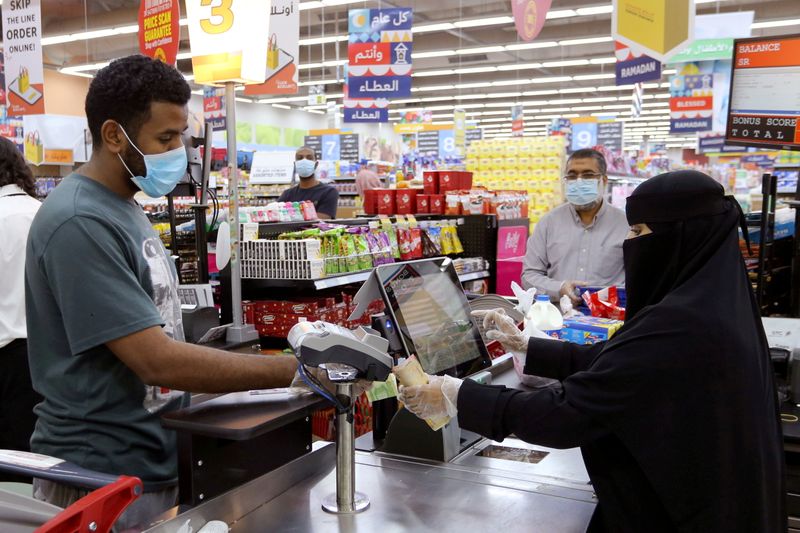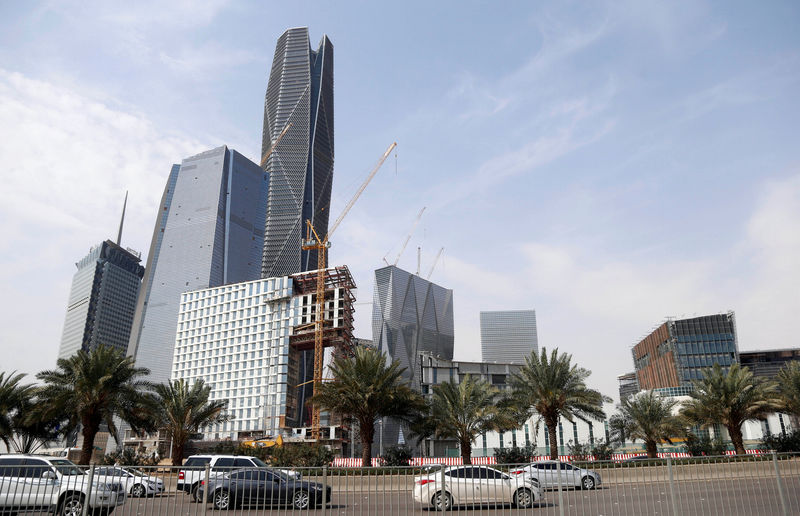By Aziz El Yaakoubi, Marwa Rashad and Davide Barbuscia
DUBAI (Reuters) - Saudi Arabia has amended its rules on imports from other Gulf Cooperation Council countries to exclude goods made in free zones or using Israeli input from preferential tariff concessions, in a bid to challenge the United Arab Emirates' status as the region's trade and business hub.
Despite being close allies, Saudi Arabia and the neighbouring UAE are competing to attract investors and businesses. Saudi Arabia - the biggest importer in the region - is trying to diversify its economy and reduce its dependence on oil, while providing more jobs for its own citizens, a point also covered by the rule changes announced at the weekend.
The two countries' national interests have increasingly diverged, such as in their relations with Israel and Turkey. They have also faced off in the last few days about a proposed OPEC+ deal to raise oil output.
Saudi Arabia will henceforth exclude from the GCC tariff agreement goods made by companies with a workforce made up of less than 25% of local people and industrial products with less than 40% of added value after their transformation process.
The ministerial decree published on the Saudi official gazette Umm al-Qura said all goods made in free zones in the region will not be considered locally made.
Free zones, a major driver of the UAE's economy, are areas in which foreign companies can operate under light regulation, and where foreign investors are allowed to take 100% ownership in companies.
According to the decree, goods that contain a component made or produced in Israel or manufactured by companies owned fully or partially by Israeli investors or by companies listed in the Arab boycott agreement regarding Israel, will be disqualified.
The UAE and Israel signed a tax treaty last May as both sides work to spur on business development after normalising relations last year. Bahrain, another GCC member, has also normalised ties with Israel under the so-called "Abraham Accords" crafted by the administration of then U.S.-President Donald Trump.
"The idea once was to create a GCC market, but now there's the realisation that the priorities of Saudi Arabia and the UAE are very different," said Amir Khan, senior economist at Saudi National Bank.
"This regulation is putting flesh on the bone of these political divergences," he said.
In February, the Saudi government said it will stop giving state contracts to businesses that base their Middle East hubs in any other country in the region. That was a blow to Dubai, one of the UAE's emirates, which has built its economy on its open-for-business credentials and the promise of a glitzy lifestyle for well-heeled expatriates.
'INCREASED COMPETITION'
Saudi Arabia has announced the latest rule changes despite the fact that UAE is its second-biggest trade partner after China in terms of import value, based on recent Saudi trade data.
It is also a major re-exporting hub for foreign products to Saudi Arabia, including Turkish goods - which have been under an unofficial boycott by Riyadh.
Turkey and Saudi Arabia have been at loggerheads since the 2011 Arab uprisings, when Riyadh accused Ankara of supporting Islamist political groups. Tensions escalated in 2018 over the murder of Saudi journalist Jamal Khashoggi in the kingdom's Istanbul consulate.
The ministerial decree said companies with a local workforce of between 10% and 25% of the total could compensate the difference by increasing the industrial added value in their products and vice versa. The added value should not be less than 15% in any case to benefit from the preferential tariff agreement, it added.
"The original customs union agreement, established Jan 2003, no longer serves the needs of the GCC countries ... including Saudi and the UAE and in light of the increased competition between the two countries pursuing similar non-oil diversification activities," said Nasser Saidi, a Dubai-based economist.
"The current dispute, while disruptive in the short-term, can open the door to a more efficient, modern, trade and investment framework and agreement that would boost growth prospects and allow for greater diversification, higher value-added regional trade," he said.

Saudi Arabia's energy minister pushed back on Sunday against opposition by the UAE to a proposed OPEC+ deal and called for "compromise and rationality" to secure agreement when the group reconvenes on Monday.
OPEC+ members voted on Friday to raise output by some 2 million barrels per day from August to December 2021 and extend remaining cuts to the end of 2022 but the UAE's objections have stalled the deal.
